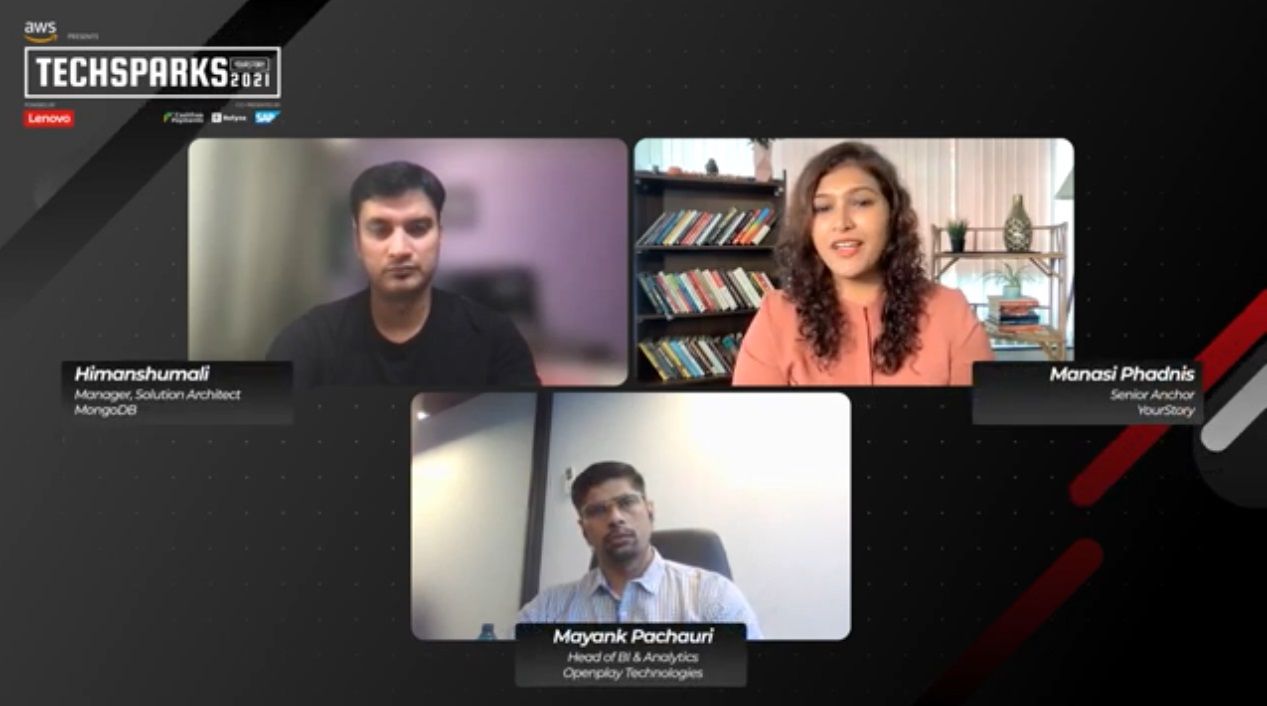The COVID-19 pandemic might have derailed plans for businesses across the globe, but it turned out to be a silver lining for digital native sectors like online gaming. Forced to sit at home due to the lockdowns and remote work settings, gaming emerged as a popular means of entertainment for many. It wasn’t long before when gaming platforms started seeing an unprecedented rise in traffic volumes.
In response, gaming portals packed on capabilities to scale and cater to a fast evolving consumer behaviour, while impressing the industry with their potential to grow.
At the same time, for many of these platforms it was a robust data management and synchronisation strategy that helped ensure seamless user experiences and avoid data conflicts.

In an engaging panel discussion during YourStory’s TechSparks 2021, Himanshumali, Manager, Solution Architect, MongoDB and Mayank Pachauri, Head of BI and Analytics, Openplay Technologies talked in depth about how data synchronisation is crucial for ensuring growth and scalability of multiplayer gaming platforms and how these platforms can unlock these benefits.
ALSO READ

Government, startups should partner to solve the pain points of the country, say industry stakeholders at TechSparks 2021
Pandemic push for gaming platforms
While the COVID-19 pandemic might have hampered the growth of several businesses, it turned out to be a catalyst for the online gaming industry, especially when the lockdowns kicked in.
Himanshumali said that while the pandemic-led surge in traffic was good for business, it also brought along several challenges like the need to scale up fast and the ability to support such a surge.
“One of our customers Gametion Technologies, which is behind the popular game Ludo King, had over 150,000 users on its platform in March 2020. By the end of the month, they had to scale up to accommodate over 1.5 million users. It saw 150 million downloads in the first week of the lockdown,” he added.
The growth recorded during the pandemic was something that gaming platforms were expecting to see over the next six-seven years, said Mayank. “Also, the average time spent on a session went up by almost 50 to 60 percent,” he said.
Openplay Technologies’ traffic volumes increased by almost 4x to 5x on a regular basis during the period, which meant that the company had to also think about scalability and concurrency.
“In India, the gaming industry had all relevant growth factors in place, be it digital transactions, mobile device availability, connectivity and higher disposable incomes. But, the pandemic was the cherry on the top,” he quipped.
ALSO READ

The next normal: How India will consume IT in the future
Why data synchronisation matters
Describing data synchronisation as an exchange of data between the end devices and backend servers, Himanshumali said that it can unlock advantages like lower latency and scalability for multiplayer gaming platforms. He further delved into how MongoDB Realm is enabling gaming platforms to simplify data synchronisation and innovate at scale.
“For starters, MongoDB Realm stores mobile data locally. So, even if a user’s internet connection is not stable, they do not face any problems and the user experience is seamless. Secondly, it facilitates an automatic sync between the mobile database and the backend. The bi-directional sync is an extremely helpful feature for any developer building an app. It shoulders tasks like building the code and maintaining the sync,” explained Himanshumali.
Another key feature of MongoDB Realm is its ‘internal conflict resolution’ that helps in resolving data conflicts. “In case the data is being sourced from multiple sources, its deterministic algorithm assesses the right data to continue with, so that the conflict is resolved,” he added.
Building the right data synchronisation strategy
For Himanshumali, an ideal data synchronisation strategy would separate read-intensive and write-intensive database workloads and scale them differently. “To that end, MongoDB’s read replica sets can help gaming platforms optimise database workloads. For example, let’s assume that a gaming platform has lakhs of users and they read the data continuously. If the platform scales the entire infrastructure, it would be cost-intensive for it. However, if it scales only the read-intensive workloads, it can optimise costs and achieve scalability,” he stated.
At the same time, MongoDB’s database as a platform offering — Atlas — manages scalability across multiple use cases. It allows gaming platforms to scale manually, vertically or horizontally and even comes with an autoscaling feature. “Autoscaling is not only useful when the user traffic goes up, but also when it is low like late at night,” said Himanshumali.
Meanwhile, for Mayank, the ideal data synchronisation strategy not only takes into account the need for scalability and reducing latency, but also market competitiveness. “As gaming platforms operate in a highly regulated market, they should build a data strategy that meets various compliances and focuses on data integrity,” he added.
ALSO READ

Why India’s D2C brigade must brace for marketing battle with FMCG giants
The road ahead
The panellists agreed that given the benefits that it can unlock for platforms, data synchronisation is likely to rule the online gaming sector in the future. According to Himanshumali, another aspect that can play a bigger role in the future is the insights that gaming platforms can draw from this data.
As the collected data grows in size, maintaining it would be a critical job. “A gaming platform might see instances wherein a user is very active on their platform for two weeks and then disappears for two months. Now, the old data can’t be removed as the user would expect the same experience in case he returns. Hence, features like archival services and data lakes that are offered by MongoDB can be helpful in managing data and harnessing it to derive actionable insights.”
To log in to our virtual events platform and experience TechSparks 2021 with thousands of other startup-tech enthusiasts from around the world, join here. Don’t forget to tag #TechSparks2021 when you share your experience, learnings and favourite moments from TechSparks 2021.
For a line-up of all the action-packed sessions at YourStory’s flagship startup-tech conference, check out TechSparks 2021 website.

Read more: yourstory.com